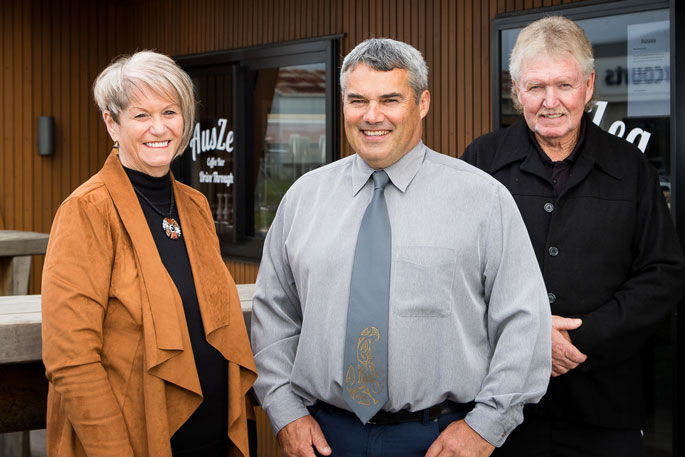Building a team culture within the council and ensuring that everyone's voice matters is David Moore's number one aim if he becomes Ōpōtiki's next mayor.
Now nearing the end of his first term as an Ōpōtiki district councillor, Moore told Ōpōtiki News it has been a rewarding experience.
Now, with the support of two of his fellow councillors, Barry Howe and Shona Browne, he's committed to standing for the mayoralty at this year's election.
He says he will not be running for the Waioeka, Waiotahe or Otara wards.
Asked what he will do differently from the current council leadership, he says he will 'listen more than dictate”.
'I've quite enjoyed working with a few of my fellow councillors.
'However, there have been times during my term when it hasn't been as rewarding as it should have been and this has left me frustrated as I've watched knowledgeable councillors sidelined, under-utilised and generally kept in the dark.
'It has never been a team. It's not through lack of trying, from day one. But when you go to meetings and one or two are inside and the other four of us are locked outside there's something seriously going wrong there. Building a team culture would be the number one thing and maybe listening a bit more. Everyone's voice matters, not just a few people.”
'My fellow councillors, Shona Browne and Barry Howe, both have a wealth of experience in local government and local business, between them, holding a wide range of roles within the community. Like myself, Opotiki is in their DNA. Together we are passionate about only wanting the best outcomes for our community.
'I am putting my name forward, but it's not really just me, it's three of us, really, saying, enough is enough. With their guidance and support, I am confident we can make the positive changes needed.”
Moore says although he doesn't have as many years of experience in local government, he does have a wide range of business and life experiences to draw upon.
He started his working life in a bank in Ōpōtiki in 1987 when Ōpōtiki was 'absolutely booming”.
'Within a year we were in the doldrums. All sorts of things happened in the sharemarket in 1987. I went full-time beekeeping and did that for 20 years. I was just over five years in the police and my wife and I have now got the Harcourts office here.
'The Ōpōtiki district should have the ability to prosper and shape its own future, to make the most of the recent large investments in aquaculture and horticulture and to nurture many other exciting and enterprising businesses.
'The council has achieved some major milestones and completed a number of impressive projects, including Te Tahuhu o te Rangi, under outgoing chief executive Aileen Lawrie, and the ongoing costs of running and maintaining these assets, along with all the other roles that council fulfils, will need to be funded whilst also keeping rates at an affordable level. This is a challenge I am looking forward to facing,” he said.
'I've been very lucky in my life. I don't need for anything, but there's lots of people doing it very tough and we just need to bring them all along. Really, all I want is what's best for our community. I have two young grandsons in town and another one on the way.”
He describes central Government's Three Waters reforms as poorly thought out and an 'attack on local democracy”.
'My personal view is that the Three Waters initiative was one of the most un-democratic decisions I have ever seen and a perfect example of local democracy under threat. Change is clearly needed, but the process and manner in which Three Waters was conducted did not give communities such as ours a fair chance to voice their concerns.
'Central government is also pushing for other changes within local government that will directly affect our district. We cannot be complacent. We will need to be vocal and pro-active to avoid undermining the many hard-working organisations we already have who are out there serving our community.
'As a Māori, they say they're going to include us in the four entities, but they've taken away all our local voice. When you've got 70-plus iwi in one entity, how are you meant to get your own voice in for your own community. It's not possible.”
He feels strongly about the community being able to make its own choices on things such as Māori wards.
People shouldn't be afraid of Māori wards, it's a positive thing. But I don't believe in mandating stuff. We have very good (Māori) representation in our council. If anything, we are overrepresented but that's a good thing - that reflects our community. "[The council is] very lucky, we have a good relationship with iwi.”
'I wouldn't like to see a situation where there was less voice for Māori. It should be up to each community to decide what they want.”
-Local Democracy Reporting is Public Interest Journalism funded through NZ On Air




1 comment
Labour in control
Posted on 01-07-2022 04:35 | By Johnney
I have witnessed this council in action. They have been made to tow the Labour Party line because of the $200M pumped in of tax payers money from the provincial growth fund. There was huge opposition to reject handing back Whanarua Reserve to local iwi which council completely ignored even though this land was part of a legitimate subdivision by one of the iwi members. Totally undemocratic.
Leave a Comment
You must be logged in to make a comment.